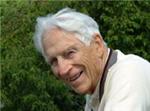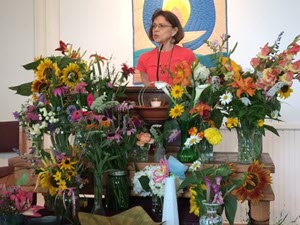
HUU Sermon Archives
Summing Up
by James Geary
13 May 2007
 Good
morning...
Good
morning...
The title of this talk is “summing up.” So it is going to be about me. But it is not going to be an autobiography; and I’ve tried not to make it an ego trip.
I will mention my ancestry. On my mother’s side they were all Virginians, all settlers in Southwest Virginia in the 1700s, English, Dutch, and Scot-Irish. On my father’s side they were early German settlers in Pennsylvania, and Potato Famine Irish, also in Pennsylvania. Quite a mixture.
My mother and her siblings were nervous, high strung, active people. Thank goodness those genes were diluted in me by my those of my easy-going laid-back father with his wonderful sense of humor.
I suppose “summing up” implies a summary of what one has learned. Tomorrow I will be 93 years old. I should have learned a lot.
It reminds me of the conversation Alistair Cooke had with a street peddler in New York who had been a peddler there for many years. Cooke asked him what he had learned in all those years. He replied: “There is no free lunch.”
Well that’s it that is about the sum of what I’ve learned. We pay for everything.
Of course, I’ve believed that for most of my adult years. As you know, from my talk last November, that is my basic philosophy. I believe in a law of compensation. Pleasure and pain are opposite sides of the same coin; we pay for pleasure with pain.
What else have I learned? I hope I have learned the classic lesson that Socrates said was the beginning of wisdom. That is that I don’t know anything, and can’t know anything, especially about such ineffable subjects as the nature of being, the origin or non-origin of the Universe, the origin of life, or even such human subjects as consciousness and compassion.
I do think we learn and never cease to learn about behavior, our own and that of our fellow beings. I have not only had a long life, but a checkered one. So I have had many opportunities to observe behavior. I’ve had more than a dozen paying jobs, I had several very different assignments in the Navy in World War II — no combat —, I’ve seen a lot of our world, both in this country and overseas. And, like most of you, I’ve had relationships of one kind or another with quite a number of boys and girls, men and women. More about women later. — I bet you can’t wait for that.
One thing I’ve learned: it’s tough world. I watch a lot of nature films on T-V. Aren’t those modern, long-range cameras wonderful. And the patient, persevering men and women behind those cameras, aren’t they wonderful.
Watching those films, I conclude that in the wild it is kill or be killed, eat or be eaten, or run for your life..
Have you seen the film of the poor gazelles trying to cross a river in Africa, and the huge crocodiles making the river red with their blood. Or the film showing the little newborn turtles trying to go the long distance from their birthplaces in the sand to the safety of the ocean, while birds and crabs do them in. Only five percent make it to the ocean; but that seems to be enough.
There is a balance in Nature, or at least there was until humankind upset the applecart and skewed the proportions in many cases.
In the wild, killing is for food, for sex, or for territory. Because we human animals have learned agriculture, we have refined this animal behavior. We don’t kill for food or sex so much as for greed, territory, or aggrandizement.
At any rate we are not satisfied with killing a single adversary or victim; we kill millions, men, women, and children; and, yes, cattle and horses and sheep, and even orchards and rain forests.
So we have greatly progressed in perfecting the means, and the disposition, to kill. So much for brotherly love,
Some people have a contrary view. They are the meliorists who think the world is getting better. They must think that killing tens of millions is better than killing hundreds or thousands.
Don’t get me wrong. I am not a misanthrope; I don’t hate our human race. I think we humans have made great progress in many good and positive areas — in medicine, sanitation, social welfare, food, language, communication, to name a few.
And maybe, just maybe, the good things outweigh the bad things. Why else would human population expand beyond any equitable or reasonable proportion for the health of the planet and the human and non-human life forms within it? The good things we do are threatening to starve us to death.
You probably are thinking, here we go again with old Jeremiah. Well, I like to call a spade a spade. I can’t help thinking we have some very bad days ahead. But I also believe people will continue to be happy as well as unhappy, come what may.
- - -
I went to the circus one time, and I learned a positive lesson there. I was an adult, a newspaper reporter. But I was not too old to be thrilled by that circus — no, not the high wire acts or the wild animal shows. It was the show after the show, the highly effective packing up by the roustabouts, working in the mud after a terrific downpour that was still continuing.
That great Hegenbeck -Wallace circus traveled on 48 railroad cars. It was in Roanoke, and it had a show the next day in Radford. It had to get moving.
I watched in awe as huge Percheron horses pulled and an elephant pushed with its head to free a massive circus wagon from a deep mud hole. Remember, also, the roustabouts had the big tent and grandstands to load on to the rail cars, and all the animals. What I learned was an appreciation for efficiency.
But the high wire acts did lead me to some philosophical thinking. It seems to me that we humans, and all life forms for that matter, are engaged in a perpetual balancing act. We have to breath in life-sustaining oxygen every few seconds. Our hearts beat every second or so. If either is interrupted, we’re done for.
Danger surrounds us, on the highway, in the workplace. Disease germs lurk everywhere, and some threaten to sweep away great chunks of the human race. We must work ceaselessly to keep from falling off the wire.
All animal life has to keep adjusting, every minute, every second. That’s what life does, that’s what defines it, continuous adjusting or adapting to new circumstances.. It adjusts to obtain food, it adjusts to reproduce, it adjusts to ward off injury and death, it adjusts to be comfortable. Life is truly a high-wire act.
- - -
Why is there pain and suffering in the world. Well it’s just the nature of things. And Nature, with a capital N, if we speak of her as a thinking person, doesn’t care about the individual, only that the species survive — and not all species at that. And Nature doesn’t care how much pain you suffer, just so you survive to propagate; and that the mother in labor and the baby survive, or enough of them to sustain the species.
So, it’s tough world. But it is also a benign world. I gave a talk here about that. Think of it: for the past three or four billion years, not one of our progenitors was killed or died before he or she was able to procreate. That’s mind boggling. And it applies to every living thing, whether in the animal kingdom or the plant kingdom.
- - -
Aside from my faith in emotional compensation, I hold another controversial belief, one that has been argued for at least the past 2300 years. I believe in fate. My grandfather, Hank Jewel, was the baby of the family. He toddled down to the spring on the family farm and fell in. If an older sister hadn’t just happened by and pulled him out, I can think of a lot of people who wouldn’t be here today. That’s fate.
Recently I got some wonderful support for my belief. In a couple of reviews of biographies of Albert Einstein, the great thinker was quoted as saying, “I am a determinist. I do not believe in free will.” And he said something else that parallels what I have talked about. He said he looked upon free will as something that was useful, indeed necessary, for a civilized society. “I am compelled to act as if free will existed,” he said, “because if I wish to live in a civilized society I must act responsibly.”
Well, to another subject. I think I’ve learned something about the relationships of men and women. Everyone, or nearly everyone, has a romantic life. From early on — probably from my teens — I came to the conclusion that life’s only purpose was to produce the next generation. So I felt it a sort of duty to life to bring more life into the world. I always wanted to have children. With five daughters, you might say I succeeded.
But I had another dream, of being married to one wonderful woman for my whole life. I dreamed we would grow old together, surrounded by our children and grandchildren. You know the picture.
It was not to be. And now, after two failed marriages, for the past 27 years and counting, I have shared my life with that wonderful woman I dreamed of. I have never been more happy.
Women have always been important, I might say central, in my life, from my mother and the other women who surrounded me and loved me from my earliest memories and while I was growing up, to the girl friends, and wives, and daughters of my adult years.
I was 15 years old when I had my first really romantic attachment, with a cousin who visited at our house with her family for several weeks. It was a sort of puppy love. Things were more innocent in those days.
When I was seventeen — I had transferred from Roanoke high school to a high school in Pittsburgh — I came home to Roanoke for the Christmas holiday. I was introduced to this happy, delightful country girl, just turned fifteen. I fell hard, and I decided to switch back to high school in Roanoke.
That relationship lasted, off and on, for more than three years. Unaccountably, it remained relatively innocent. I guess that speaks for my naivete, as well as to her terror at becoming pregnant. And then, when I was barely 20 years old, I went off to Pittsburgh to try to find work. It was the Great Depression year of 1935, and, though I had one year at Roanoke College, I could not find work.
And then, after some fruitless weeks in Pittsburgh, I came back to Roanoke, my heart was broken. My girl had fallen in love with a 26-year-old man who had a job. She was engaged to be married. I was shattered. I can remember the agony. As my friend Ed Sellers said, “It tears your guts out.”
Well, it was the best thing that could happen. I went off to the University of Virginia where I eventually graduated. I had a small scholarship and the family felt they could rake together enough to help me.
But her rejection of me left a deep scar. It was made all the worse because I was a poor student in Charlottesville, a town where the families who could afford it sent their daughters out of town for the school year — and with good reason. But I spent three lonely years there. I think the whole experience had a cauterizing effect.
We all suffer from one thing or another. Some wise person said: “all personal growth proceeds from suffering.” I think most of you can resonate with that.
I believe there is something peculiar about my emotions. I haven’t cried in 40 years or more, not when my father died, not when my mother died. And yet, a dramatic incident or development in a movie or on TV, or in a story, will bring tears to my eyes. This is especially true if I am sharing the experience with a relative or friend, or if I am reading aloud to them. Is there a psychologist in the house?
- - -
What have I learned about women. Oh, that’s a dangerous and abstruse subject. But I will hazard a theory, that I am sure many others hold. I believe, that, generally speaking, what a woman most wants from a man, more than anything, is a feeling of security. It’s not sex, as some crude men seem to think; its not luxuries, diamond rings and the like. It is the feeling that he loves her, needs her, that she is important to him, that he admires and respects her as a whole woman, mental as well as physical, that he will be faithful, and will always provide for her.
Well, this talk has been quite a potpourri.
- - -
Today is Mothers’ Day. So I will talk a bit about my mother, who was one of the two people who more than any others influenced the development of my mind. My mother had a fine mind; and she was extremely liberal, although she was too shy to be an activist. I didn’t always agree with her. She was one of those people who think the world is getting better. But we were very close intellectually.
She left my father in Pittsburgh and took my sister and me back to her father’s place in Virginia when I was four, a pretty cruel thing to do. But my mother and father never divorced, and as the years passed their friendship steadily increased, especially after the grandchildren were born.
Soon after the separation, she suffered a terrible trauma that she never really got over. It was the loss of her two-year-old daughter, my baby sister. My mother became a nomad, wandering from city to city as a free-lance writer or newspaper reporter. I lived with my aunt. My mother would come back — it was her home too — for weeks or months. And then she would take off again.
Only the Great Depression and her failing health, which made it impossible for her to find work, brought her home to stay. The years that followed were the ones when we became really close.
When I was 27, I married a woman who, unaccountably, hated my mother. So my mother felt she had to earn her own living. In 1948, at the age of 68, she went to Washington to pursue a career as a professional genealogist. Washington is home to the National Archives, the Library of Congress, and the DAR library, great sources of genealogical information. She earned her living there at that work until she was 87 years old.
As I have mentioned before, she lived to be 100. But at 95 she suffered a painful and crippling deterioration of a vertebra Her mind remained clear and sharp, almost up to the day she died, despite having been five years flat on her back in a nursing home. She was a noble lady.
- - -
What about my future. I feel as my friend Victor Barringer did. He said, when he was about 70, that he didn’t need to go anywhere or have new experiences. He’d been to enough places and done enough in his life, that he could just spend the rest of his life thinking about them.
Pat and I will continue to travel as long as I am able; but I don’t need it. I, too, could just think about my past life, and enjoy simple living in the present. We have hanging on our walls, some 44 photographs that Pat and I have taken on our trips to National parks and other places. Sometimes I just go about the house looking at those pictures and remembering our times there. We have stacks of albums filled with photos and descriptions of trips. And we have our home and our yard and our dog — and our church. And sometimes our children come to see us.
Carol Channing, the singer and actress, was quoted as saying “It’s wonderful to be 84.” I think it can also be wonderful to be 93and still in love with life and with the beauty in the world.
Read more sermons or talks by Jim Geary.
Return to Sermon Archives
For the latest sermons and events at HUU, visit our Community Cafe.
Inclement
Weather Policy
Worship
Service Materials


UUs on YouTube
Our denomination has an official presence on YouTube! The Unitarian Universalist Association's YouTube site includes several videos and lots of interesting commentary.
Harrisonburg Unitarian Universalists 4101 Rawley Pike | Harrisonburg,
VA 22801
Mailing Address: | PO Box 96 | Harrisonburg, VA 22803
| (540) 867-0073 | Webmaster
HUU is a member of the Southern
Region of the Unitarian Universalist
Association
Privacy Policy &
Disclaimer
Site Design & Maintainence : Expression
Web Tutorials & Templates


